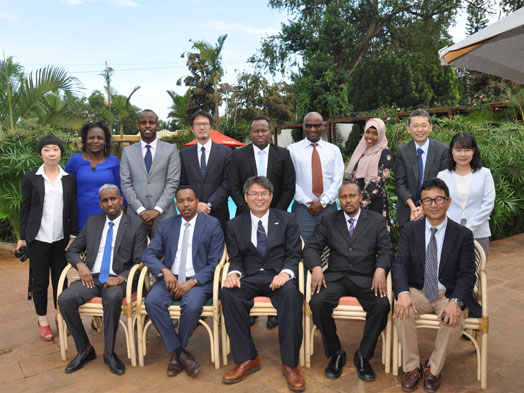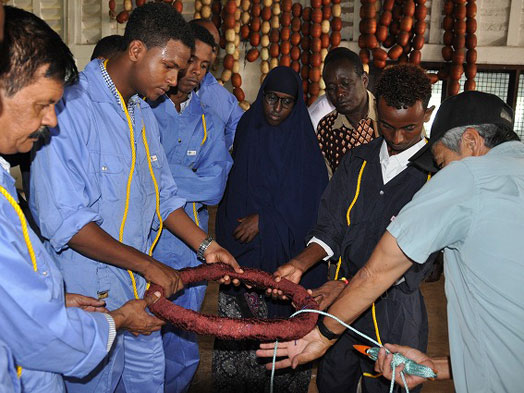Youth Employment Project for Somalia
|
■Sector |
: Employment promotion for youth |
|
■Type of technical service |
: Technical Cooperation |
|
■Duration |
: February 2018 - December 2021 |
|
|
|
3rd Joint Coordinating Committee meeting in Kampala, Uganda |
Background
After a long period of civil war since 1991, Somalia established the federal government in 2012, and since then the country has been working hard for its peacebuilding and nation building with support from international community. In 2017, the presidential election was held and the federal government was newly formed. However, there still remain a number of internal challenges such as security improvement, infrastructure development and provision of social services, and job creation for youth is among such key issues. In particular, about 70 percent of the population is youth under the age of 30. Some of them without employment opportunities take part in piracy or terrorism to earn their living, which has been recognized as one of serious social problems in Somalia.
In 2014, the then-President of the Federal Government of Somalia (FGS) visited Japan and requested the Government of Japan (GoJ) and Japan International Cooperation Agency (JICA) to support employment promotion for youth in Somalia. Based on this request, JICA conducted “Youth Employment Baseline Study (YEBS) for Somalia” from 2015 to 2017 in order to confirm the current employment status and identify major industries in Somalia by literature review, and implemented pilot trainings in selected sectors. With findings and outcomes from the study, FGS officially requested GoJ in March 2017 for a technical cooperation to promote youth employment. When the request was accepted by GoJ, JICA carried out the detailed design study for technical cooperation and finally agreed with relevant Ministries of FGS in May 2017 on comprehensive technical assistance for industrial promotion in Somalia, including support for entrepreneurs who are expected to contribute to promoting youth employment.
Basic Principles
|
|
|
An expert demonstrates rope work during the training of trainers (TOT) on fisheries |
Aiming at improving environment surrounding youth employment and entrepreneurship, the Project has three basic principles as below.
“Formulation of sector development plans integrated with human resource development plans for the selected pilot industries”
In order to expand employment opportunities for youth, it is important to revitalize industries as a whole, by not only supporting labor supply (= human resources to be employed) but also providing measures to increase demand side of labor market (= companies to employ). For this purpose, the Project (1) identifies industries potentially contribute to the national economic growth and job creation / entrepreneurship for youth, and (2) supports formulation of sector development plans for the selected industries in line with the National Development Plan and the National Employment Policy.
“Development of industrial human resources including the youth for the selected industries”
The youth in search for employment need to be equipped with skills to meet the needs of industries and companies. However, opportunities for education and training to learn such skills are limited in Somalia. It is due to the prolonged civil war which impeded development of technical and vocational education and training (TVET), and shortage of human resources that provide technical trainings (e.g. private companies, vocational schools, cooperative associations, etc.). To address this issue, the Project provides training of trainers (ToT) for TVET and other technical training institutes so that the ToT participants are able to teach youth and disseminate skills they learned.
“Capacity development for start-ups and existing companies in Somalia as suppliers of employment opportunities”
Technical trainings as above would not contribute by themselves to increase employment opportunities, without demand for human resources by private companies. Therefore, enabling environment should be in place to promote entrepreneurs and private companies for future job creation. In this regard, the Project addresses capacity development of organizations and institutions which have provided supports to entrepreneurs and existing companies.
Main Activities
The Project is currently being operated remotely from neighboring countries of Somalia, since the Project team cannot enter into the country due to its unstable security situation. In spite of such challenges and difficulties, we make all kinds of efforts to maximize outputs of the Project.
Firstly, the Project organized systems to facilitate communication and coordination with Somali counterparts even from remote. For example, the Project invites Somali counterparts to Nairobi, the capital of Kenya, with support from JICA Kenya office, for face-to-face meetings to build consensus on key issues of the Project at appropriate timings. We also use e-mails and Skype for a daily communication to confirm the progress of activities and exchange relevant information in different locations such as Somalia, Kenya, and Japan. Besides, JICA provides additional support including dispatching Somali advisors to the counterpart Ministries in cooperation with International Organization for Migration (IOM) for smoother communication with the local stakeholders, coordination, and information collection.
The followings are the main concrete activities in the first phase (from February 2018 to December 2019).
①Selection of the pilot industries
Based on information collection and analysis on key industries in Somalia, the Project identifies pilot industries per phase through discussions with counterparts, taking into account expected growth of the industry and its potential for youth entrepreneurship and job creation, as well as possibility for collaboration with other donor agencies. In November 2018, the fisheries sector was selected as the first pilot industry, and activities such as ToT has been implemented. In December 2019, the construction sector was newly selected as the second pilot industry, and the Project started activities on the sector from the second phase.
② Support for policy development including human resources development in the pilot industry (fisheries)
Responding to strong needs of the Ministry of Fisheries and Marine Resources for policy development, the Project supported formulation of the first draft of the fisheries policy through discussions with the counterparts of the Ministry.
③ Implementation of training on trainers (ToT) for the fisheries sector
The Project implemented ToT for those who are in charge of training the young human resources at the Ministry, universities, cooperatives, etc. Practical training was provided in Tanzania, facing the Indian Ocean shared with Somalia, through a combination of exercises and lectures on fishery production techniques such as fishing gears like Fish Aggregating Devices (FADs), fishing methods and processing, and management issues such as organizing fishermen, marketing, and fishery resource management, which are key areas to be improved in the industry.
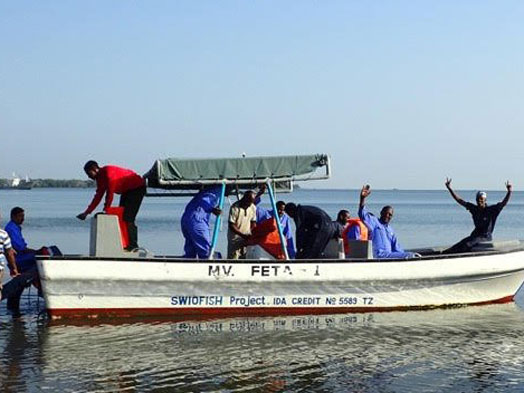
|
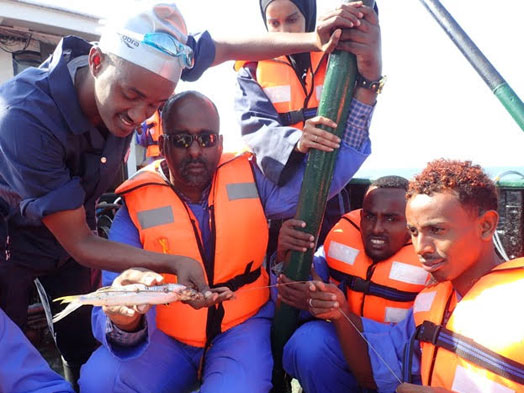
|
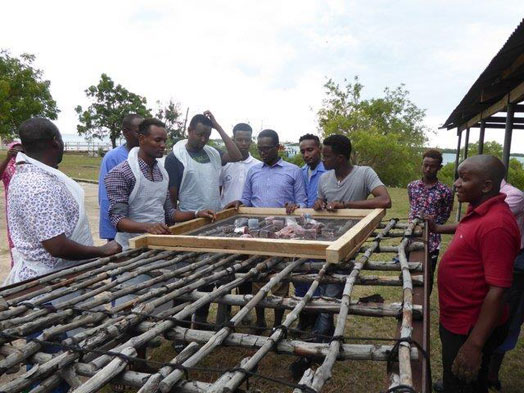 |
|
Exercise of marine navigation |
Exercise of fishing methods |
Exercise of processing technique to make dried fish |
④ Implementation of the workshop on capacity development on start-ups and Micro, Small and Medium Enterprises (MSMEs)
The workshop on capacity development for start-ups and MSMEs was conducted in Uganda. Participants from Somalia consisted of members from the private sector (i.e. university, training institutions, consulting firms, incubation centers, fishing companies, cooperatives, and NGOs) and officers from the government sector. The program included practices of Problem Analysis, Business Model Canvas, panel discussions, field visits to start-ups and MSMEs in Uganda, and discussion on training and support program development in Somalia. The program gained good evaluation by the participants. After the workshop, an app-based network was set up among participants, instructors, facilitators, and experts to share a variety of information and to monitor activities remotely.
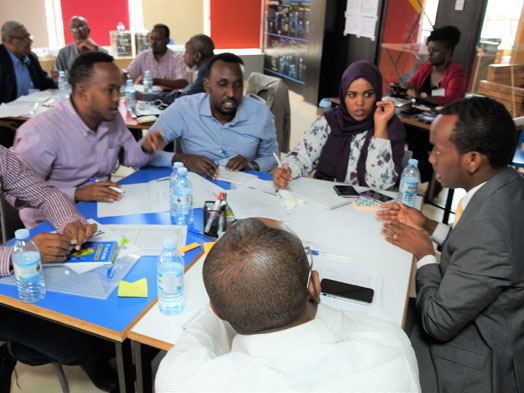
|
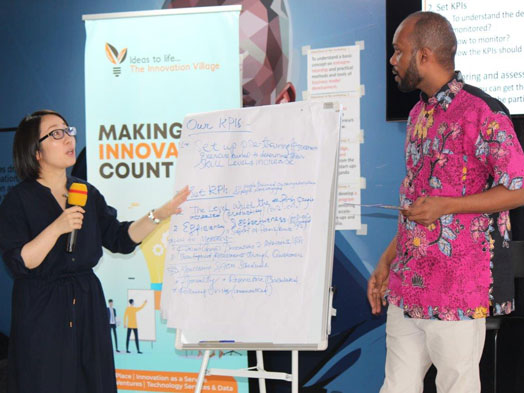 |
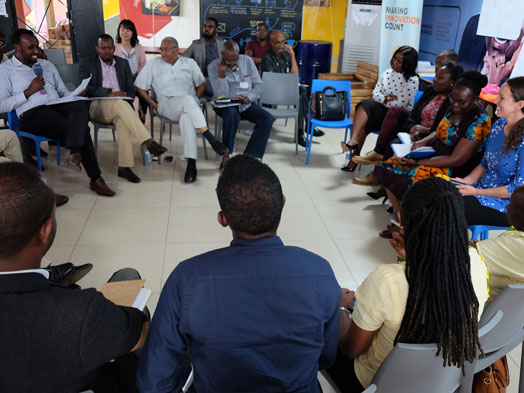
|
|
Group work session among the participants |
A participant (right) making presentation on the group work outcomes, and an expert (left) commenting on that |
Discussions with entrepreneurs in Uganda |
As the project progresses, follow-ups in Somalia become more and more important after a series of activities, and close coordination and collaboration with local partners are essential for that. To realize it, we will actively share information with local development partners, and continue activities considering the methods of follow-ups, the way and schedule of monitoring and evaluation on the progress and outputs of the Project.
Since March 2020, Somalia, Kenya, and Japan have been taking countermeasures against the COVID-19 pandemic. Despite that the project activities in the field had no choice but to postpone, the Project has been maintaining communication with the counterparts more than ever through online to prepare for the resumption of the field activities.
(as of ctober 2020)
~For more information~
→JICA 『Supporting reconstruction from Somalia's civil war by expanding youth employment opportunities』 (External Link)
A Message from the Consultant in-charge
|
|
|
Etsuko OSUMI Consultant |
We face various challenges to implement the Project since we have to support from outside of Somalia. However, building up relationships and mutual trust is critically important for any projects. I would like to make a cooperative relationship by piling up opportunities of communications as much as possible via the Internet and phone calls, and by responding sincerely to the Somali counterparts working under the unstable security conditions to overcome limited face-to-face opportunities.
When we want to understanding more about “unreachable” Somalia, we may tend to rely on the information from the Internet. However, our project team carefully listens to the opinions and ideas of Somali counterparts through the meetings and activities to reflect their voices on the Project. We continue to shed a light on the additional value which the activities operated outside Somalia can provide and carefully consider how to promote the use of the outputs of the Project in Somalia for the benefit of Somalia.
